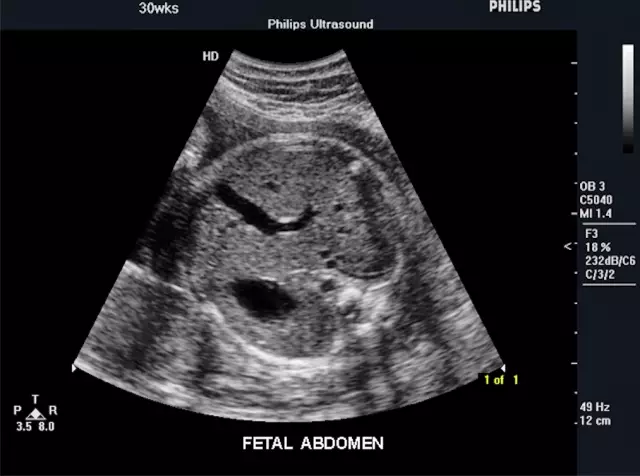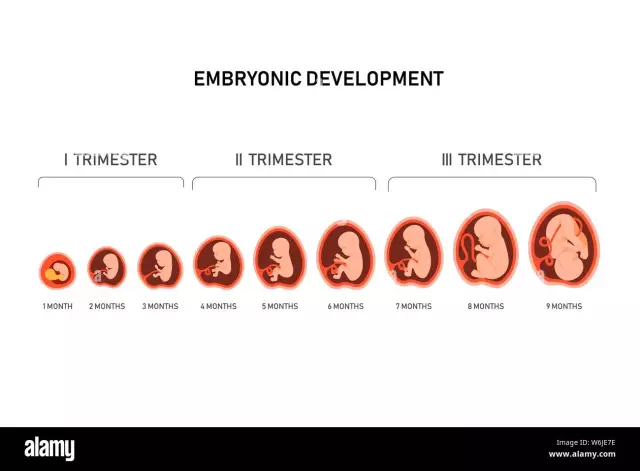- Author Rachel Wainwright wainwright@abchealthonline.com.
- Public 2023-12-15 07:39.
- Last modified 2025-11-02 20:14.
23 weeks pregnant

At 23 weeks of gestation, 21 weeks have passed since fertilization occurred, the sixth lunar month of pregnancy.
Changes in the body of the unborn baby
The size of the fetus at 23 weeks of gestation continues to increase, and the proportions of the body are approaching that of a newborn. In size, the fetus at 23 weeks of gestation is about 29 cm long, weighs about 520 - 550 g, its head circumference is 56 cm.
The development of the respiratory system of the future baby is progressing at a rapid pace, there are more and more alveoli in the lungs, and their special cells - type 2 macrophages - begin to produce surfactant. A surfactant is a complex of lipids that change the surface tension of the alveoli and prevent them from collapsing. Thanks to him, the lungs are constantly in a straightened state, that is, the alveoli do not stick together and can carry out the respiratory function. At 23 weeks of gestation, the amount of surfactant is still very small, but by the end of pregnancy it will accumulate enough.
The amount of amniotic fluid according to ultrasound from the 23rd week of pregnancy no longer increases, and now the growing fetus will experience some space deficit. Because of this, his movements in the abdomen at 23 weeks of pregnancy feel better, and sometimes even cause discomfort to the mother.
The embryonic pose with arms and legs bent at the joints allows the future baby to occupy the optimal volume in the uterine cavity. Despite the limited volume of the uterus, the fetus in the abdomen at the 23rd week of pregnancy is still actively changing its position, and its head is either below or above.
The fetal digestive system is quite well prepared for work, at the 23rd week of pregnancy, the esophagus, stomach, liver, all parts of the intestine, and the pancreas are already formed and developed. They can secrete digestive juices and enzymes, the intestines contain meconium - the original feces.
Brown fat continues to accumulate between the shoulder blades and around the internal organs - it will provide the baby with energy at first, while digestion is rebuilt to the lactotrophic type.
At the 23rd week of pregnancy, the spleen not only forms blood cells, but also controls their quality indicators. Abnormal blood cells are destroyed by the spleen.

Some researchers claim that from the 23rd week of pregnancy, the fetus can dream. This is confirmed by the fixation of bioelectric signals from his brain.
Changes in a woman's body at 23 weeks of gestation
At the 23rd week of pregnancy, in addition to the already habitual movements and jerks of the fetus, a woman can record the hiccup of the unborn child. These sensations are similar to a rhythmic start of low intensity. Hiccuping, in this case, is the training of future respiratory movements of the fetus.
Discharge at 23 weeks of gestation from a woman's genital tract in the form of odorless light mucus is a variant of the norm. They usually get worse during pregnancy and should not be a cause for concern. Bloody discharge at the 23rd week of pregnancy is always a sign of its dysfunctional course. This is either the onset of a miscarriage, or placental abruption - in any case, emergency medical attention is needed. The threat of termination can be indicated by regular pain in the 23rd week of pregnancy in the lower abdomen, and the feeling of a petrified abdomen.
The abdomen at 23 weeks of gestation continues to increase in size, the fundus of the uterus is determined 23 cm above the pubic joint.
Examination at 23 weeks of gestation
During a routine examination, a gynecologist may prescribe a blood glucose test. Pregnancy can be a triggering factor in the development of gestational diabetes mellitus. Excessive glucose levels not only negatively affect the woman's body, it also harms the fetus.
Blood and urine tests remain relevant for a given gestational age. The doctor sends for an ultrasound examination of those pregnant women who did not undergo it at 20 - 22 weeks. An ultrasound scan at 23 weeks of pregnancy also allows you to find out the gender of the unborn baby.
YouTube video related to the article:
Found a mistake in the text? Select it and press Ctrl + Enter.






